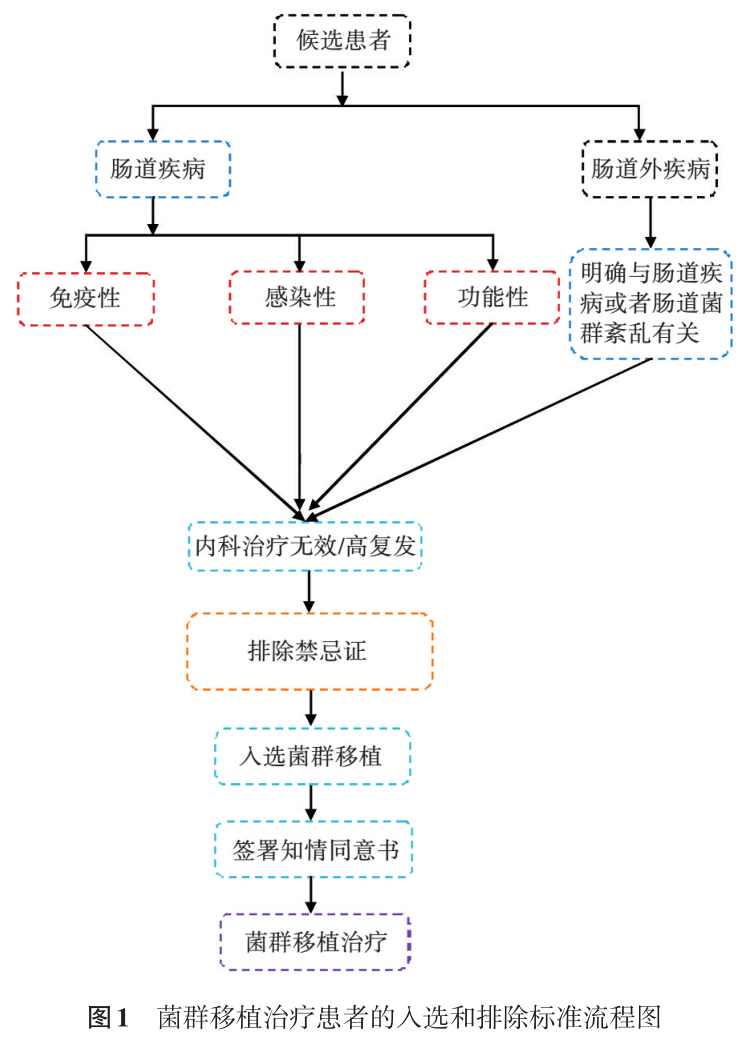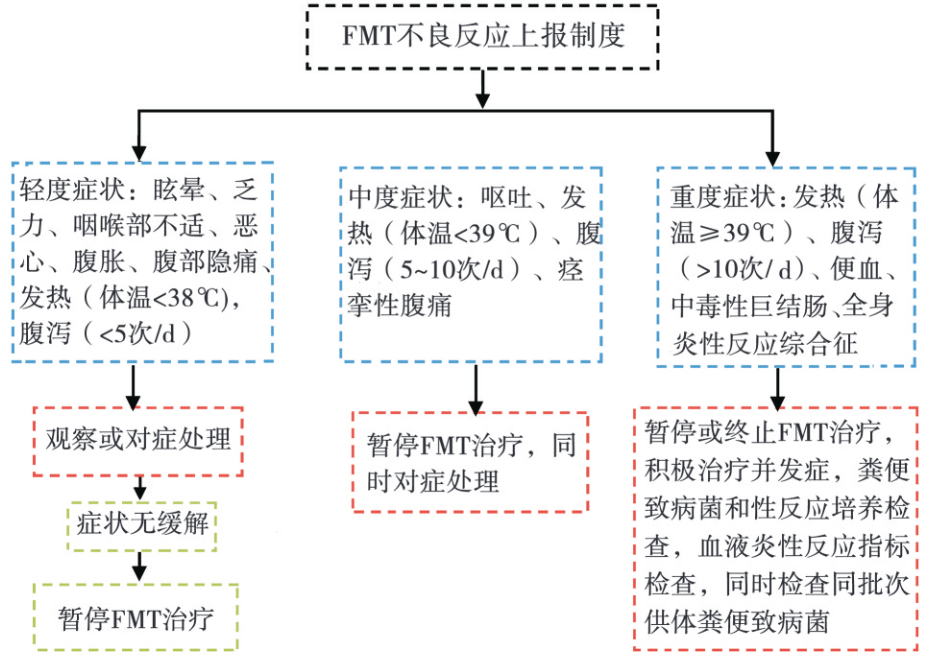 菌群移植标准化方法学的建立与临床 应用中国专家共识
菌群移植标准化方法学的建立与临床 应用中国专家共识
# 菌群移植标准化方法学的建立与临床应用中国专家共识
中华医学会肠外肠内营养学分会,中国国际医疗保健促进交流会加速康复外科分会,中国微生态治疗创新联盟,等。菌群移植标准化方法学的建立与临床应用中国专家共识 [J]. 中华胃肠外科杂志,2020,23 (Z1):5-13. DOI:10.3760/cma.j.cn.441530-20200420-00231.
# 【摘要】
菌群移植(FMT)是将健康人粪便中的功能菌群移植到患者肠道内,重建新的肠道菌群,实现肠道及肠道外疾病的治疗。近 10 年来,FMT 在治疗肠道内和肠道外疾病方面取得了突破性的进展,临床上对 FMT 能够治疗肠道内外疑难疾病寄予厚望。但是,由于 FMT 方法学的建立较为复杂,且国内外尚无统一的标准,导致了各类研究疗效的异质性较大,极大地影响了 FMT 的临床推广应用。在中华医学会肠外肠内营养学分会、中国国际医疗保健促进交流会加速康复外科分会、中国微生态治疗创新联盟和上海预防医学会微生态专业委员会的倡议下,制定了我国首个关于菌群移植标准化方法学及临床应用专家共识,以期提高 FMT 的疗效,降低不良反应的发生率,促进 FMT 的临床应用推广
# 一、诊疗服务与设施
FMT 门诊和病房提供疾病评估、FMT 移植与随访服务(1A)
FMT 中心应建立生物安全 2 级的实验室提供检测、制备菌液和胶囊、样本存储服务,并为联盟单位提供菌液和胶囊服务(1A)
提供移植途径建立服务,包括内镜、透视或者盲插鼻肠管、灌肠等(1B)
当需要重复 FMT 治疗时,首次 FMT 可住院实施;后期的 FMT 可在门诊进行,由于门诊治疗存在一定风险,有条件的单位可开展 FMT 日间病房。FMT 日间病房提供疾病诊断、评估、检验、肠镜检查,胶囊和菌液 FMT 治疗。对于病情稳定的轻中度患者,经评估后可在日间病房进行 FMT 治疗,观察 4 h 无不良反应后即可出院(2C)
# 二、多学科诊疗团队
- 建立胃肠病医师、感染科医师、检验科医师、微生物医师以及护理等团队(1A)
- 配备内镜医师和熟悉透视下或盲放鼻肠管医师(1B)
- 配备菌液和胶囊制备专业化技术操作团队,以及生物信息分析专业技术人员(1B)
- 配备心理医师团队进行心理干预(肠功能障碍性疾病患者往往伴有心理障碍)(2C)
# 三、供体的筛选与管理流程
# (一)标准供体筛选标准
- 生理上主要依赖科学测量与实验室检测完成(1A) (1)内科外科体格检查均为阴性; (2)年龄 18~30 周岁, 体质指数(body mass index,BMI)18.5~23.9 kg/m2; (3)血液学检测:血常规、肝肾功能、电解质和 C 反应蛋白正常,甲乙丙丁戊肝、人类免疫缺陷病毒(human immunodeficiency virus, HIV)、梅毒、人类疱疹病毒(epstein⁃barr virus,EB 病毒)、巨细胞病毒、线虫、阿米巴等病原检测阴性; (4)粪便检测:粪便常规检查正常,隐血实验阴性,艰难梭菌、弯曲菌、沙门菌、志贺菌、产志贺毒素大肠杆菌及虫卵、囊泡、寄生虫、孢子、诺如病毒、轮状病毒等病原学检测阴性,多重耐药基因[碳青霉烯类耐药的肠杆菌科(CRE),产广谱 β⁃内酰胺酶菌(ESBL)和耐甲氧西林的金黄色葡萄球菌(MRSA)等耐药菌]检测阴性; (5)血清 单基 因遗 传性 疾病 阴性 ; (6)粪便 新型 冠状 病毒 (COVID⁃19)阴性。
- ** 心理上主要依赖访谈与量表完成(2B) ** (1)心理科医师或心理咨询师访谈认为患者目前心理状态良好; (2)抑郁自评量表(self⁃rating depression scale,SDS)、 焦虑自评量表(self⁃rating anxiety scale,SAS)、匹兹堡睡眠质量指数(pittsburgh sleep quality index,PSQI)等评分正常。
- ** 个人史主要依赖访谈与问卷完成(1A) ** (1)既往病史:近 2 周未出现胃肠道不适,近 3 个月内未使用抗生素、抑酸剂、免疫抑制剂、化疗药等,无慢性疼痛症状,无消化系统手术史,无传染病史及传染病接触史,无过敏性疾病、自身免疫疾病、代谢性疾病、心脑血管疾病和神经系统或精神疾病史,无恶性肿瘤病史,未接受过生长激素、胰岛素、凝血因子等静脉注射; (2)个人史:作息规律,饮食健康, 家庭和睦,无不良性交,无吸烟、饮酒或吸毒等嗜好,无药物成瘾,近 6 个月未接种过疫苗或参加药物试验、未接受纹身或出现皮肤破损以及未接触过疫区和热带地区; (3)家族史: 无胃肠道病变家族史,无恶性肿瘤家族史,无传染病家族史; (4)其他:非孕期,非月经期。
- ** 供体稳定性依赖生化检查及粪便微生物组测序完成 (2B) ** (1)每 2 个月复查以上条目,仍然符合上述要求; (2)每次捐赠的粪便均留样进行 16S rDNA 测序,保证菌群组成及多样性稳定。
- 建立档案与随访系统以保证供体的持续性(2B) 供体应保证长期捐赠粪便,至少每周 2 次,每次不少于 100 g。
- 供体的限食耐受性通过限食实验完成(2C) 部分 患者 存在 食物 过敏 及食 物不 耐受(如鸡 蛋 、牛奶 等)。根据受体要求,对相应供体需在捐赠粪便前 5 d 限制食物种类,若该供体不可耐受,则不可作为本次移植的捐赠者。
# (二)超级供体筛选标准
- 供体⁃患者疗效的数据模型,即回顾性统计供体治疗所对应的 50 例患者的有效率,将总体有效率≥75% 的供体作为超级供体(2C)
- 以 60% 有效率为临界点,分析疗效率≥或<60% 组间的菌群及代谢产物特征,作为后续供体筛选的指标(2D)
- 外倾性(extraversion)和开放性(openness)性格特征为超级供体指标(2C)
性格特征与肠道菌群密切相关[44]。本中心采用中文版 Bigfive 性格特征模型,其包括外倾性(extraversion)、宜人性 (agreeableness)、尽责 性 conscientiousness)、神经质性 (neuroticism)和开放性(openness)5 个维度对供体性格特征进行分析;回顾性分析发现,24 例有效率≥60% 的供体性格特征为外倾性和开放性,这两个维度均 > 20 分,神经质性 <15 分,其他两个维度无差异。
# (三)供体管理标准
- 供体的管理由 FMT 中心专职供体管理人员负责(2C)
- 在开始筛选过程之前,候选捐赠者应签署书面知情同意书,每次捐献粪便时均需填写问卷表,以评估健康状况的变化(2B)
- 重复捐献粪便者,每 8~12 周需要重新体检[39](1A)
- 对每位供体建立档案与随访信息(2C) 供体管理人员需与供体定期保持沟通交流,并建立良好的信任关系,对供体的生活方式和饮食结构进行必要的管理和干预,及时纠正不良的生活方式和饮食结构,并根据随访结果及时剔除不合格供体。
- 供体至少每周捐献粪便 2 次,每次≥100 g,如捐献粪便 <100 g,被认为是存在胃肠功能异常可能(2B)
# 四、菌液制备标准操作流程(SOP)
粪便应在粪菌库的特定一次性容器中现场收集;在粪菌库外收集,应将收集的粪便迅速冷却至 4°C,6 h 内送至粪菌库; 在粪便库中接受信息登记、粪便鉴定、称重、评估和处理[39,45]。 处理过程尽量保持在厌氧环境中。菌液制备后放置 - 80°C 冰箱内保存,有效期为 6 个月[3]。在菌液的使用当天,需放置 37°C 水浴箱解冻,解冻后的菌液必须在 6 h 内使用完毕[1]。
- 菌液应在捐献后 6 h 内,在厌氧环境下完成菌液制备 (1A)
- 菌液制备后放置 - 80°C 冰箱内保存,有效期为 6 个月 (1A)
- 每个供体捐献的粪便除了制备菌液和常规筛查检测以外,必须留一份 2 ml 的菌液保存至少 6 个月,一旦出现异常具有可追溯性(1C)
- 菌液必须注明供体信息代码、捐献日期、生产和出厂日期、有效期、剂量及存储温度等(2C)
# 五、FMT 患者入选和排除标准(流程图见图 1)
目前,临床指南及共识推荐 FMT 治疗复发性或难治性 CDI[1⁃3]。除此之外,FMT 在消化系统的疾病(如 IBD、IBS、功能性便秘、肝性脑病等)、神经精神系统疾病(如自闭、焦虑、 抑郁症和帕金森疾病)、代谢性疾病(糖尿病、肥胖症、脂肪肝和高脂血症)和免疫性系统性疾病(如肿瘤免疫、过敏性疾病以及慢性疲劳综合征)等病种中,均显示出一定的临床疗效[5,11,14,19]。目前,对 FMT 的适应证介于过度宽泛和过度严格的矛盾之中,部分学者过度夸大 FMT 的作用,而另一部分学者对 FMT 表现消极心态,这两者均会阻碍 FMT 的科学发展。
# (一)入选标准
- 明确与肠道菌群紊乱有关的肠道内疾病:肠功能障碍性疾病、肠道感染性疾病、肠道免疫性疾病等(1C)
- 明确与肠道疾病或者肠道菌群紊乱有关的肠道外疾病:便秘合并帕金森病、便秘或腹泻合并自闭症、便秘或腹泻合并过敏性皮炎(2C)
- 患者需充分理解 FMT 治疗过程及机制,并签署知情同意书(2C)
# (二)排除标准
- 严重免疫抑制者(中性粒细胞 < 1 500 个 /mm3,淋巴细胞 < 500 个 /mm3)(1B)
- 肠黏膜严重破坏者(1C)
- 未能明确肠黏膜损伤病因者(2C)
- 当前诊断为暴发性结肠炎或中毒性巨结肠者(1C)
- 因存在严重腹泻、显著纤维性肠腔狭窄、严重消化道出血、高流量肠瘘等原因,无法耐受 50% 热卡需求的肠内营养者(1C)
- 合并严重系统性感染,符合全身性炎性反应综合征 (systemic inflammatory response syndrome, SIRS)诊断 标准者(1B)
- 合并肠外器官感染,必须使用广谱抗生素干预者(2C)
- 合并严重营养不良(体质指数 < 15 kg/m2),严重低蛋白血症者(白蛋白 < 25 g/L)(2C)
- 先天或获得性免疫缺陷病患者(1B)
- 近期接受高风险免疫抑制 / 细胞毒性药物治疗者:例如利妥昔单抗、阿霉素或中高剂量类固醇激素(20 mg/d 泼尼松或更高剂量)持续应用 4 周以上(1B)
- 怀孕或哺乳期女性(1A)
# 图 1 菌群移植治疗患者的入选和排除标准流程图

# 六、肠道准备标准和方法
受体患者肠道内的菌群可影响 FMT 的疗效。受体粪便中梭杆菌属的存在与 FMT 失败相关[18]。受体肠道内微生物可通过创造生态位点和(或)资源竞争形成对供体微生物种群产生 “定植屏障”。因此,移植前使用抗生素预处理可以使定植于肠道内的细菌释放空间,使得移植菌更容易定植于肠道内,并与致病菌产生竞争作用[34]。肠道准备不足是 FMT 失败的独立预测因素[46]。目前,大部分的研究均在抗生素使用后、FMT 移植前进行抗生素的清洁肠道(洗脱),如果在 FMT 前使用泻药清洁肠道,可去除可能影响移植微生物定植的残留抗生素,以及艰难梭菌毒素和孢子[47⁃49]。
- 移植前 3 d 常规经肠道给予万古霉素(0.5 g,2 次 /d)作为主要的 FMT 前的抗生素预处理(1A)
- 特殊类型如 IBS 患者,可使用利福昔明,真菌感染则使用抗真菌药物等肠道去污方案(2B)
- 复杂肠道感染,应根据培养结果选择敏感抗生素(2B)
- 如合并病毒感染,应给予抗病毒治疗方案(2C)
- 移植 前 24 h 常规 给予 聚乙 二醇(通常 为 2 L)清洁 肠道(1A)
# 七、FMT 治疗时机标准
FMT 治疗时机尚无定论,在复发性 CDI 的疗中,建议首选抗生素[万古霉素和(或)非达霉素]治疗 10 d 无效后再选择 FMT 的治疗[45,50⁃52]。虽然 FMT 治疗各类疾病表现出较好的临床效果,但其机制及长期疗效并不明确,故 FMT 不作为初始治疗的首选,应在传统已经证实有效的治疗手段无效的情况下选择[3]。
- 复发性 CDI 首选万古霉素、甲硝唑和非达霉素治疗, 经治疗 10~14 d 无效时选择 FMT 治疗(1A)
- 其他疾病包括慢性便秘、功能性肠病(IBS、功能性腹胀和腹痛)、IBD、肝性脑病、代谢综合征、自闭症、帕金森病和抑郁症等,经传统有效的治疗手段治疗无效后、或者目前尚无有效治疗手段、或高复发率的疾病,可尽早选择 FMT 治疗(2C)
# 八、FMT 治疗剂量标准
单次粪便的使用量 30~60 g / 次均有报道[53⁃54]。目前,大多数研究使用粪便 50 g / 次[55]。然而,最近有研究显示,即使 30 g 的粪便也可达到良好疗效[56⁃57]。但是,同一疾病不同受体、或者不同疾病间受体肠道菌群差异较大,供体之间肠道菌群差异也较大,单一使用粪便重量来衡量不够精准,目前主要以 16 sRNA 来检测供体和受体间肠道菌群丰度和多样性,该方法并不能鉴别细菌的活性,忽略必须移植活菌方可产生治疗作用,因此以每次移植的活菌数量作为标准更精准,且移植的活菌量还需个体化。
- 移植以活菌量作为治疗剂量标准,每次移植的活菌量需≥2.5×1012CFU(2C)
- 人移植粪便量需≥30 g / 次,儿童以 1 g/kg 体质量计算(2C)
# 九、FMT 治疗疗程和重复治疗周期标准
目前,移植次数和移植周期无统一标准。在 FMT 大部分的研究中,均使用单次移植[51,53]。对初始 FMT 无反应的患者进行重复 FMT,可获得较高的成功率;即使是对首次 FMT 反应不佳的患者也是如此[51⁃52,58⁃59]。无论是第 1 次治疗失败或者复发的患者,第 2 次 FMT 的成功率似乎很高,因此对部分 FMT 无效的 CDI 患者,可在 24~72 h 内重复治疗[60⁃62]。对于伪膜性结肠炎 FMT 治疗失败的患者,每 3 d 重复 1 次 FMT, 可获得成功治疗[52]。早期、重复的 FMT 治疗,可以提高 CDI 的疗效(70%~100%)[63⁃66]。CDI 疾病病因相对单一,单次的 FMT 治疗、或者次数较少的重复治疗可获得较高的有效率, 但对于在宿主⁃微生物组相互作用更复杂的疾病中,可能需要更为有规律的疗程和更长的治疗周期[67]。如对溃疡性结肠炎的两项临床研究发现,连续 8 周的 FMT 治疗可获得较高的临床缓解,因此建议进行 FMT 次数的强化治疗[11,67]。有研究显示,增加移植剂量和次数可增加疗效[54]。但严格筛选供体的粪便为有限的资源,在确保疗效的前提下,尽量减少粪便资源和医疗资源的浪费,即对于不同的疾病,需要形成科学合理的治疗疗程和周期。
- 每天 1 次,连续治疗 6 d 的菌液治疗作为 1 个标准治疗疗程,除不宜或不能耐受肠镜或鼻肠管者,标准治疗均以菌液为主;如改善则连续 6 d 的胶囊治疗作为巩固治疗,每个疗程间均间隔 4 周(1C)
- CDI 患者 1 个标准治疗疗程有效,则巩固治疗 1 疗程 (2B)
- 慢性便秘和肠易激综合征若 2 个标准治疗疗程改善, 则给予 2 个疗程巩固治疗;IBD 若 4 个标准治疗疗程改善,则给予 4 个疗程巩固治疗;自闭症 2 个疗程胶囊治疗若改善,则给予 4 个疗程胶囊巩固治疗(2C)
- 出现如下情况,应再增加 1 个标准疗程:
- (1)并发的疾病或者使用的药物明显影响肠道菌群;
- (2)病程每增加 5 年;
- (3)年龄≥65 岁(2D)
# 十、联合用药标准
研究表明,FMT 联合果胶较 FMT 组,对便秘治疗有效率明显更高[68⁃70]。FMT 联合果胶较单纯 FMT 治疗,溃疡性结肠炎患者临床缓解率更高[30]。FMT 联合肠内营养治疗重度腹泻合并营养不良的患者也获得良好的疗效[33]。
1.FMT 全程使用益生菌 + 益生元(1C)
2. 合并中重度肠功能障碍或营养不良,则需联合肠内营养(2C)
3. 联合治疗并存疾病如肠⁃脑轴异常(焦虑、抑郁、帕金森等)、肠⁃内分泌与代谢系统、肠⁃肾脏轴和肠⁃肺轴等与肠道相关的肠道外疾病(1C)
# 十一、FMT 临床治愈或缓解标准
FMT 治愈、改善或无效尚无统一的标准。同一疾病不同人、或者不同疾病其治愈和改善的时间也不一致。FMT 治疗 CDI 临床治愈(或缓解)的时间在 3~5 d,甚至 6 个月不等[71⁃72]。 共识性 FMT 治愈或缓解 CDI 的标准为 “以消除症状为主要指标”;在 FMT 治疗后 8 周内症状消失作为次要终点[40]。由于 CDI 毒性检测存在假阴性或者假阳性,因此不作为 FMT 治疗疗效的标准,主要还是以症状为主[73]。其他疾病 FMT 治疗疗效评价未见报道。
- 复发性 CDI:治疗后 8 周临床症状持续完全缓解(成型粪便 < 3 次 /d)和艰难梭状芽孢杆菌 A 和 B 毒素阴性,受体菌群多样性恢复至供体菌群多样性 50% 以上(1B)
- 慢性便秘:治疗后 8 周,完全自主排粪次数超过 3 次 / 周、 肠道菌群多样性恢复至供体菌群多样性 50% 以上为治愈;排便 次数 较治 疗前 改善 ≥50%,但未 达到 治愈 标准 者为 有效 (2C)
- 克罗恩病(Crohn's disease,CD):治疗后 12 周临床症状缓解,且菌群多样性恢复至供体菌群多样性 50% 以上。 (1)缓解:CD 疾病活动指数(AI)<150 分为临床缓解标准; (2)有效:CDAI 下降≥100 分(2C)
- 溃疡性结肠炎(ulcerative colitis,UC):治疗后 12 周临床症状缓解,且菌群多样性恢复至供体菌群多样性 50% 以上:(1)缓解:UC 的 Mayo 评分为 0 分(临床症状消失,结肠镜复查见黏膜大致正常或无活动性炎性反应);(2)有效: Mayo 评分≤2 分,其中内镜的子项目≤1 分(临床症状基本消失,结肠镜复查见黏膜轻度炎性反应)(1C)
- 肠易激综合征(IBS):连续 3 个月未出现与排粪频率、 排粪形式相关的腹痛或不适症状,且菌群多样性恢复至供体菌群多样性 50% 以上为治愈。满足下列任 1 条即为显效: (1)治疗开始后连续 1 周未出现腹痛或不适;(2)IBS⁃C 患者排硬或块状粪便<25%、同时稀或水样粪便<25%,IBS⁃D 患者排稀或水样粪便<25%、同时硬或块状粪便<25%,IBS⁃M 患者排硬或块状粪便<25%、同时稀或水样粪便<25%(1C)
- 自闭症:治疗第 12 周,自闭症 ABC 量表评分 < 31 分、且 CGI⁃I 评分 1 分,菌群多样性恢复至供体菌群多样性 50% 以上为治疗显效。治疗第 12 周自闭症 ABC 量表评分 < 67 分 、 且 CGI⁃I 评分 1~2 分或 5 个 ABC 子量表中至少 2 个较基线有 50% 或更大的下降,而其他子量表均未出现 10% 或更大的上升为治疗有效(2C)
# 十二、随访制度与随访平台建立
由于 FMT 还有诸多的未知领域,其长期疗效、不良反应等都需要关注,因此,长期科学的随访是必要的。随访方式包括门诊复查,电话和网络问卷等模式。FMT 的随访时间从 60 d 至 8 年不等[71,74]。一些专家共识推荐,FMT 后至少为期 8 周的随访,以充分评估疗效和潜在不良事件[3]。
- 配备专职随访人员(2C)
- 建立网络化随访平台,门诊和电话随访作为补充方式,根据不同疾病,建立不同随访内容,包括疗效、并发症等 (1C)
- 随访周期:分为短期 3 个月内和长期 1 年内的随访, FMT 治疗后随访 4、8、12、24 和 48 周 5 个时间点(2C)
# 十三、不良反应处理流程和标准(流程图见图 2)
FMT 主要的不良反应为消化道症状如恶心呕吐、腹痛腹胀 、腹泻 ,消化 道外 症状 主要 为发 热 ,极少 部分 肺部 感染 等[51,55,75⁃78]。除 2019 年报道 2 例病例导致严重的多重耐药菌感染,其中 1 例死亡外,并未见严重不良反应发生,大部分症状均为自限性[3,79]。
- 建立不良反应上报制度(2C)
- 执行严格的入选和排除标准,FMT 治疗前评估并发症风险(1C):(1)误吸风险,如高龄、卧床、贲门关闭不全等高风险者禁用鼻肠管途径,给予口服胶囊或结肠镜 FMT 途径;(2)肠源性感染风险,如全身免疫力及肠黏膜屏障功能严重受损应禁用 FMT 治疗(1C)
- 症状轻(以头晕、恶心、胃肠道不适等为主诉)的患者, 观察即可(1C)
- 中度症状对症处理,不能缓解予以暂停 FMT 治疗 (2D)
- 症状严重(由鼻肠管途径导致的咽喉部疼痛、恶心、呕吐等)者,对症处理不能缓解,给予拔除鼻肠管,改口服胶囊、 结肠镜或灌肠移植途径(2D)
- 症状严重者,暂停或终止 FMT 治疗并对症处理;体温≥39°C 者需排除肠源性感染(2D)
- 怀疑肠源性感染症状时,立即终止 FMT 治疗,检测供体和受体粪便致病菌,留取血培养检查,给予抗感染、补液等治疗(1C)
- 极重度症状如并发生命体征异常者,立即终止 FMT 治疗,同时针对靶器官治疗(1C)
# 图 2 菌群移植(FMT)不良反应处理流程图

# 参考文献
[1] Cammarota G,Ianiro G,Tilg H,et al. European FMT Working Group. European consensus conference on fecal microbiota transplantation in clinical practice[J]. Gut,2017,66(4):569⁃ 580. DOI:10.1136/gutjnl⁃2016⁃313017. [2] McDonald LC,Gerding DN,Johnson S,et al. Clinical practice guidelines for clostridium difficile infection in adults and children:2017 Update by the Infectious Diseases Society of America (IDSA) and Society for Healthcare Epidemiology of America(SHEA)[J]. Clin Infect Dis,2018,66(7):987 ⁃ 994. DOI:10.1093/cid/ciy149. [3] Mullish BH,Quraishi MN,Segal JP,et al. The use of faecal microbiota transplant as treatment for recurrent or refractory Clostridium difficile infection and other potential indications: joint British Society of Gastroenterology (BSG)and Healthcare Infection Society(HIS)guidelines[J]. Gut,2018,67(11):1920⁃ 1941. DOI:10.1136/gutjnl⁃2018⁃316818. [4] Surawicz CM,Brandt LJ,Binion DG,et al. Guidelines for diagnosis, treatment, and prevention of Clostridium difficile infections[J]. Am J Gastroenterol,2013,108(4):478⁃499. DOI: 10.1038/ajg.2013.4. [5] 李宁,田宏亮,陈启仪,等。菌群移植治疗肠道疾病 2 010 例疗效分析[J]. 中华胃肠外科杂志,2019,22(9):861⁃868. DOI: 10.3760/cma.j.issn.1671⁃0274.2019.09.011. [6] Zhang X,Tian H,Gu L,et al. Long⁃term follow⁃up of the effects of fecal microbiota transplantation in combination with soluble dietary fiber as a therapeutic regimen in slow transit constipation [J]. Sci China Life Sci,2018,61(7):779⁃786. DOI:10.1007/ s11427⁃017⁃9229⁃1. [7] Wei Y,Yang J,Wang J,et al. Successful treatment with fecal microbiota transplantation in patients with multiple organ dysfunction syndrome and diarrhea following severe sepsis[J]. Crit Care,2016,20(1):332. DOI:10.1186/s13054⁃016⁃1491⁃2. [8] Gu B, Bo GZ, Ke C. Exploration of fecal microbiota transplantation in the treatment of refractory diarrhea after renal transplantation[J]. Transplant Proc,2018,50(5):1326 ⁃ 1331. DOI:10.1016/j.transproceed.2018.03.013. [9] El ⁃ Salhy M,Hatlebakk JG,Gilja OH,et al. Efficacy of faecal microbiota transplantation for patients with irritable bowel syndrome in a randomised,double ⁃ blind,placebo ⁃ controlled study[J]. Gut,2020,69(5):859⁃867. DOI:10.1136/gutjnl⁃2019 ⁃319630. [10] Halkjær SI,Christensen AH,Lo B,et al. Faecal microbiota transplantation alters gut microbiota in patients with irritable bowel syndrome: results from a randomised, double ⁃ blind placebo ⁃ controlled study[J]. Gut,2018,67(12):2107 ⁃ 2115. DOI:10.1136/gutjnl⁃2018⁃316434. [11] Costello SP, Hughes PA, Waters O, et al. Effect of fecal microbiota transplantation on 8 ⁃ week remission in patients with ulcerative colitis:a randomized clinical trial[J]. JAMA,2019, 321(2):156⁃164. DOI:10.1001/jama.2018.20046. [12] Paramsothy S,Nielsen S,Kamm MA,et al. Specific bacteria and metabolites associated with response to fecal microbiota transplantation in patients with ulcerative colitis [J]. Gastroenterology,2019,156(5):1440⁃1454.e2. DOI:10.1053/j. gastro.2018.12.001. [13] Sokol H, Landman C, Seksik P, et al. Fecal microbiota transplantation to maintain remission in Crohn's disease:a pilot randomized controlled study[J]. Microbiome,2020,8(1):12. DOI:10.1186/s40168⁃020⁃0792⁃5. [14] Kang DW,Adams JB,Gregory AC,et al. Microbiota transfer therapy alters gut ecosystem and improves gastrointestinal and autism symptoms:an open⁃label study[J]. Microbiome,2017,5 (1):10. DOI:10.1186/s40168⁃016⁃0225⁃7. [15] Van Laar T,Boertien JM,Herranz AH. Faecal transplantation, pro ⁃ and prebiotics in Parkinson's disease;hope or hype?[J]. J Parkinsons Dis,2019,9 Suppl 2:S371 ⁃ S379. DOI:10.3233 / JPD⁃191802. [16] Huang H,Xu H,Luo Q,et al. Fecal microbiota transplantation to treat Parkinson's disease with constipation:a case report[J]. Medicine(Baltimore),2019,98(26):e16163. DOI:10.1097 / MD.0000000000016163. [17] Cai T,Shi X,Yuan LZ,et al. Fecal microbiota transplantation in an elderly patient with mental depression[J]. Int Psychogeriatr, 2019,31(10):1525⁃1526. DOI:10.1017/S1041610219000115. [18] Kootte RS,Levin E,Salojärvi J,et al. Improvement of insulin sensitivity after lean donor feces in metabolic syndrome is driven by baseline intestinal microbiota composition[J]. Cell Metab, 2017,26(4):611⁃619.e6. DOI:10.1016/j.cmet.2017.09.008. [19] Bajaj JS,Fagan A,Gavis EA,et al. Long⁃term outcomes of fecal microbiota transplantation in patients with cirrhosis [J]. Gastroenterology,2019,156(6):1921⁃1923.e3. DOI:10.1053/j. gastro.2019.01.033. [20] Routy B,Le Chatelier E,Derosa L,et al. Gut microbiome influences efficacy of PD ⁃ 1 ⁃ based immunotherapy against epithelial tumors[J]. Science,2018,359(6371):91⁃97. DOI:10. 1126/science.aan3706. [21] Gopalakrishnan V,Spencer CN,Nezi L,et al. Gut microbiome modulates response to anti ⁃ PD ⁃ 1 immunotherapy in melanoma patients[J]. Science,2018,359(6371):97⁃103. DOI:10.1126/ science.aan4236. [22] Gu L,Ding C,Tian H,et al. Serial frozen fecal microbiota transplantation in the treatment of chronic intestinal pseudo ⁃ obstruction:a preliminary study[J]. J Neurogastroenterol Motil, 2017,23(2):289⁃297. DOI:10.5056/jnm16074. [23] 杨波,顾立立,张雪莹,等。粪菌移植治疗顽固性便秘合并抑郁 18 例的临床疗效[J]. 中华消化杂志,2018,38(3):197⁃199. DOI:10.3760/cma.j.issn.0254⁃1432.2018.03.013 [24] 张薛磊,田宏亮,马春联,等。阶段性菌群移植治疗顽固性便秘疗效观察[J]. 中华胃肠外科杂志,2017,20(12):1355⁃1359. DOI:10.3760/cma.j.issn.1671⁃0274.2017.12.008. [25] 朱轶凡,周妍,顾立立,等。菌群移植治疗艰难梭状芽胞杆菌感染 18 例临床观察[J]. 中国实用外科杂志,2017,37(12): 1413⁃1415. DOI:10.19538/j.cjps.issn1005⁃2208.2017.12.23. [26] 花月,顾立立,田宏亮,等。粪便菌群移植治疗腹泻型肠易激综合征 12 例临床疗效观察[J]. 中国微生态学杂志,2017, 29(6):621⁃624,629. DOI:10.13381/j.cnki.cjm.201706001. [27] Gu L, Ding C, Tian H, et al. Use of gastrografin in the management of faecal impaction in patients with severe chronic constipation:a randomized clinical trial [J]. ANZ J Surg,2019, 89(3):239⁃243. DOI:10.1111/ans.14863. [28] Ding C,Fan W,Gu L,et al. Outcomes and prognostic factors of fecal microbiota transplantation in patients with slow transit constipation:results from a prospective study with long ⁃ term follow⁃up[J]. Gastroenterol Rep(Oxf),2018,6(2):101⁃107. DOI:10.1093/gastro/gox036. [29] Tian H,Ge X,Nie Y,et al. Fecal microbiota transplantation in patients with slow ⁃ transit constipation:a randomized,clinical trial[J]. PLoS One,2017,12(2):e0171308. DOI:10.1371 / journal.pone.0171308. [30] Wei Y,Gong J,Zhu W,et al. Pectin enhances the effect of fecal microbiota transplantation in ulcerative colitis by delaying the loss of diversity of gut flora[J]. BMC Microbiol,2016,16(1): 255. DOI:10.1186/s12866⁃016⁃0869⁃2. [31] Tian H, Ding C, Gong J, et al. Treatment of slow transit constipation with fecal microbiota transplantation:a pilot study [J]. J Clin Gastroenterol,2016,50(10):865 ⁃ 870. DOI: 10.1097/MCG.0000000000000472. [32] Tian H,Ding C,Gong J,et al,Capsulized fecal microbiota transplantation for relapsing Clostridium difficile infection[J]. J Clin Gastroenterol,2015,49(6):537⁃538. DOI:10.1097/MCG. 0000000000000330. [33] 陈启仪,田宏亮,杨波,等。菌群移植联合肠内营养治疗顽固性腹泻伴重度营养不良 71 例疗效分析[J]. 中国实用外科杂志, 2019,39(11):1199⁃1202,1215. DOI:10.19538/j.cjps.issn 1005⁃ 2208.2019.11.19. [34] Ng SC,Kamm MA,Yeoh YK,et al. Scientific frontiers in faecal microbiota transplantation: joint document of Asia ⁃ Pacific Association of Gastroenterology (APAGE) and Asia ⁃ Pacific Society for Digestive Endoscopy(APSDE)[J]. Gut,2020,69(1): 83⁃91. DOI:10.1136/gutjnl⁃2019⁃319407. [35] Lai CY,Sung J,Cheng F,et al. Systematic review with meta ⁃ analysis:review of donor features,procedures and outcomes in 168 clinical studies of faecal microbiota transplantation[J]. Aliment Pharmacol Ther,2019,49(4):354⁃363. DOI:10.1111/ apt.15116. [36] Guyatt GH,Oxman AD,Vist GE,et al. GRADE Working Group. GRADE:an emerging consensus on rating quality of evidence and strength of recommendations[J]. BMJ,2008,336(7650): 924⁃926. DOI:10.1136/bmj.39489.470347.AD. [37] Atkins D,Best D,Briss PA,et al. GRADE Working Group. Grading quality of evidence and strength of recommendations[J]. BMJ,2004,328(7454):1490. DOI:10.1136/bmj.328.7454.1490. [38] Jørgensen S,Hvas CL,Dahlerup JF,et al. Banking feces:a new frontier for public blood banks?[J]. Transfusion,2019,59(9): 2776⁃2782. DOI:10.1111/trf.15422. [39] Cammarota G,Ianiro G,Kelly CR,et al. International consensus conference on stool banking for faecal microbiota transplantation in clinical practice[J]. Gut,2019,68(12):2111 ⁃ 2121. DOI: 10.1136/gutjnl⁃2019⁃319548. [40] Bakken JS, Borody T, Brandt LJ, et al. Fecal Microbiota Transplantation Workgroup. Treating Clostridium difficile infection with fecal microbiota transplantation [J]. Clin Gastroenterol Hepatol,2011,9(12):1044⁃1049. DOI:10.1016/j. cgh.2011.08.014. [41] Moayyedi P,Surette MG,Kim PT,Libertucci J,et al. Fecal microbiota transplantation induces remission in patients with active ulcerative colitis in a randomized controlled trial[J]. Gastroenterology,2015,149(1):102 ⁃ 109. e6. DOI:10.1053 / j. gastro.2015.04.001. [42] Kassam Z,Dubois N,Ramakrishna B,et al. Donor screening for fecal microbiota transplantation[J]. N Engl J Med,2019,381 (21):2070⁃2072. DOI:10.1056/NEJMc1913670. [43] 李宁,田宏亮,马春联,等。菌群移植治疗肠道疾病 406 例疗效分析[J]. 中华胃肠外科杂志,2017,20(1):40⁃46. DOI:10.3760/cma.j.issn.1671⁃0274.2017.01.009. [44] Kim HN, Yun Y, Ryu S, et al. Correlation between gut microbiota and personality in adults:a cross⁃sectional study[J]. Brain Behav Immun,2018,69(12):374⁃385. DOI:10.1016/j.bbi. 2017.12.012. [45] Lee CH,Steiner T,Petrof EO,et al. Frozen vs fresh fecal microbiota transplantation and clinical resolution of diarrhea in patients with recurrent Clostridium difficile infection: a randomized clinical trial [J]. JAMA,2016,315(2):142⁃149. DOI: 10.1001/jama.2015.18098. [46] Ianiro G,Valerio L,Masucci L,et al. Predictors of failure after single faecal microbiota transplantation in patients with recurrent Clostridium difficile infection:results from a 3 ⁃ year,single ⁃ centre cohort study[J]. Clin Microbiol Infect,2017,23(5):337. e1⁃337.e3. DOI:10.1016/j.cmi.2016.12.025. [47] Mai V,Stine OC. Bowel preparation for colonoscopy:relevant for the gut's microbiota?[J]. Gut,2015,64(10):1504⁃1505. DOI: 10.1136/gutjnl⁃2014⁃308937. [48] Jalanka J, Salonen A, Salojärvi J, et al. Effects of bowel cleansing on the intestinal microbiota[J]. Gut,2015,64(10): 1562⁃1568. DOI:10.1136/gutjnl⁃2014⁃307240. [49] O'Brien CL, Allison GE, Grimpen F, et al. Impact of colonoscopy bowel preparation on intestinal microbiota[J]. PLoS One,2013,8(5):e62815. DOI:10.1371/journal.pone.0062815. [50] Hota SS,Sales V,Tomlinson G,et al. Oral vancomycin followed by fecal transplantation versus tapering oral vancomycin treatment for recurrent Clostridium difficile infection:an open ⁃ label,randomized controlled trial[J]. Clin Infect Dis,2017,64 (3):265⁃271. DOI:10.1093/cid/ciw731. [51] van Nood E,Vrieze A,Nieuwdorp M,et al. Duodenal infusion of donor feces for recurrent Clostridium difficile[J]. N Engl J Med, 2013,368(5):407⁃415. DOI:10.1056/NEJMoa1205037. [52] Cammarota G,Masucci L,Ianiro G,et al. Randomised clinical trial: faecal microbiota transplantation by colonoscopy vs. vancomycin for the treatment of recurrent Clostridium difficile infection[J]. Aliment Pharmacol Ther,2015,41(9):835 ⁃ 843. DOI:10.1111/apt.13144. [53] El ⁃ Salhy M,Hatlebakk JG,Gilja OH,et al. Efficacy of faecal microbiota transplantation for patients with irritable bowel syndrome in a randomised,double ⁃ blind,placebo ⁃ controlled study[J]. Gut,2020,69(5):859⁃867. DOI:10.1136/gutjnl⁃2019⁃ 319630. [54] El⁃Salhy M,Hausken T,Hatlebakk JG. Increasing the dose and/ or repeating faecal microbiota transplantation(fmt)increases the response in patients with irritable bowel syndrome(IBS)[J]. Nutrients,2019,11(6):1415. DOI:10.3390/nu11061415. [55] Gough E,Shaikh H,Manges AR. Systematic review of intestinal microbiota transplantation (fecal bacteriotherapy) for recurrent Clostridium difficile infection[J]. Clin Infect Dis,2011,53 (10):994⁃1002. DOI:10.1093/cid/cir632. [56] Costello SP,Tucker EC,La Brooy J,et al. Establishing a fecal microbiota transplant service for the treatment of clostridium difficile infection[J]. Clin Infect Dis,2016,62(7):908 ⁃ 914. DOI:10.1093/cid/civ994. [57] Satokari R,Mattila E,Kainulainen V,et al. Simple faecal preparation and efficacy of frozen inoculum in faecal microbiota transplantation for recurrent Clostridium difficile infection ⁃ ⁃ an observational cohort study[J]. Aliment Pharmacol Ther,2015, 41(1):46⁃53. DOI:10.1111/apt.13009. [58] Kelly CR,Khoruts A,Staley C,et al. Effect of fecal microbiota transplantation on recurrence in multiply recurrent Clostridium difficile infection:a randomized trial [J]. Ann Intern Med,2016, 165(9):609⁃616. DOI:10.7326/M16⁃0271. [59] Youngster I,Sauk J,Pindar C,et al. Fecal microbiota transplant for relapsing Clostridium difficile infection using a frozen inoculum from unrelated donors:a randomized,open ⁃ label, controlled pilot study[J]. Clin Infect Dis,2014,58(11):1515⁃ 1522. DOI:10.1093/cid/ciu135. [60] Zainah H,Hassan M,Shiekh ⁃ Sroujieh L,et al. Intestinal microbiota transplantation,a simple and effective treatment for severe and refractory Clostridium difficile infection[J]. Dig Dis Sci,2015,60(1):181⁃185. DOI:10.1007/s10620⁃014⁃3296⁃y. [61] Youngster I,Russell GH,Pindar C,et al. Oral,capsulized, frozen fecal microbiota transplantation for relapsing Clostridium difficile infection[J]. JAMA,2014,312(17):1772⁃1778. DOI: 10.1001/jama.2014.13875. [62] Fischer M,Sipe BW,Rogers NA,et al. Faecal microbiota transplantation plus selected use of vancomycin for severe ⁃ complicated Clostridium difficile infection: description of a protocol with high success rate[J]. Aliment Pharmacol Ther, 2015,42(4):470⁃476. DOI:10. 1111/apt.13290. [63] Hocquart M,Lagier JC,Cassir N,et al. Early fecal microbiota transplantation improves survival in severe Clostridium difficile infections[J]. Clin Infect Dis,2018,66(5):645⁃650. DOI:10. 1093/cid/cix762. [64] Berro ZZ,Hamdan RH,Dandache IH,et al. Fecal microbiota transplantation for severe clostridium difficile infection after left ventricular assist device implantation:a case control study and concise review on the local and regional therapies[J]. BMC Infect Dis,2016,16:234. DOI:10.1186/s12879⁃016⁃1571⁃6. [65] Million M,Hocquart M,Seghboyan JM,et al. Faecal microbiota transplantation as salvage therapy for fulminant Clostridium difficile infections[J]. Int J Antimicrob Agents,2015,46(2): 227⁃228. DOI:10.1016/j.ijantimicag.2015.05.002. [66] Lagier JC,Delord M,Million M,et al. Dramatic reduction in Clostridium difficile ribotype 027 ⁃ associated mortality with early fecal transplantation by the nasogastric route:a preliminary report [J]. Eur J Clin Microbiol Infect Dis,2015,34(8):1597⁃1601. DOI:10.1007/s10096⁃015⁃2394⁃x. [67] Paramsothy S,Kamm MA,Kaakoush NO,et al. Multidonor intensive faecal microbiota transplantation for active ulcerative colitis:a randomised placebo⁃controlled trial [J]. Lancet,2017, 389(10075):1218⁃1228. DOI:10.1016/S0140⁃6736(17)30182⁃4. [68] Ge X, Tian H, Ding C, Gu L, et al. Fecal microbiota transplantation in combination with soluble dietary fiber for treatment of slow transit constipation:a pilot study[J]. Arch Med Res,2016,47(3):236⁃242. DOI:10.1016/j.arcmed.2016. 06.005. [69] 顾立立,葛晓龙,张雪莹,等。水溶性膳食纤维联合益生菌治疗慢传输型便秘的 35 例临床研究[J]. 中国医师杂志,2018, 20(9):1383⁃1385. DOI:10.3760/cma.j.issn.1008⁃1372.2018.09. 028. [70] 葛晓龙,丁超,龚剑峰,等。菌群移植联合水溶性膳食纤维和益生菌治疗慢性便秘的近期疗效观察[J]. 中华胃肠外科杂志, 2016,19(12):1355⁃1359. DOI:10.3760/cma.j.issn.1671⁃0274. 2016.12.010. [71] Yoon SS,Brandt LJ. Treatment of refractory/recurrent C. difficile⁃ associated disease by donated stool transplanted via colonoscopy: a case series of 12 patients[J]. J Clin Gastroenterol,2010,44(8): 562⁃566. DOI:10.1097/MCG.0b013e3181dac035. [72] Lee CH,Belanger JE,Kassam Z,et al. The outcome and long⁃ term follow ⁃ up of 94 patients with recurrent and refractory Clostridium difficile infection using single to multiple fecal microbiota transplantation via retention enema[J]. Eur J Clin Microbiol Infect Dis,2014,33(8):1425 ⁃ 1428. DOI:10.1007 / s10096⁃014⁃2088⁃9. [73] Allegretti JR,Allegretti AS,Phelps E,et al. Asymptomatic Clostridium difficile carriage rate post⁃fecal microbiota transplant is low:a prospective clinical and stool assessment[J]. Clin Microbiol Infect,2018,24(7):780.e1⁃780.e3. DOI:10.1016/j. cmi.2017.10.022. [74] Rubin TA, Gessert CE, Aas J, et al. Fecal microbiome transplantation for recurrent Clostridium difficile infection:report on a case series[J]. Anaerobe,2013,19:22⁃26. DOI:10.1016/j. anaerobe.2012.11.004. [75] Agrawal M,Aroniadis OC,Brandt LJ,et al. The long ⁃ term efficacy and safety of fecal microbiota transplant for recurrent, severe,and complicated Clostridium difficile infection in 146 elderly individuals[J]. J Clin Gastroenterol,2016,50(5):403 ⁃ 407. DOI:10.1097/MCG.0000000000000410. [76] Angelberger S,Reinisch W,Makristathis A,et al. Temporal bacterial community dynamics vary among ulcerative colitis patients after fecal microbiota transplantation [J]. Am J Gastroenterol,2013,108(10):1620 ⁃ 1630. DOI:10.1038 / ajg. 2013.257. [77] Cui B,Feng Q,Wang H,et al. Fecal microbiota transplantation through mid⁃gut for refractory Crohn's disease:safety,feasibility, and efficacy trial results [J]. J Gastroenterol Hepatol,2015,30(1): 51⁃58. DOI:10.1111/jgh.12727. [78] Khoruts A, Rank KM, Newman KM, et al. Inflammatory bowel disease affects the outcome of fecal microbiota transplantation for recurrent Clostridium difficile infection[J]. Clin Gastroenterol Hepatol,2016,14(10):1433⁃1438. DOI:10. 1016/j.cgh.2016.02.018. [79] DeFilipp Z ,Bloom PP ,Torres Soto M ,et al. Drug⁃resistant E. coli bacteremia transmitted by fecal microbiota transplant [J]. N Engl J Med,2019,381(21):2043⁃2050. DOI:10.1056/ NEJMoa1910437. (收稿日期:2020⁃04⁃08) (本文编辑:卜建红)
